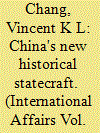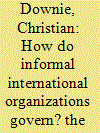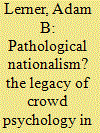|
|
|
Sort Order |
|
|
|
Items / Page
|
|
|
|
|
|
|
| Srl | Item |
| 1 |
ID:
185864


|
|
|
|
|
| Summary/Abstract |
This article contributes to the growing literature on how authoritarian regimes deploy disinformation and conspiracy theories to achieve foreign policy goals. While the effectiveness of these measures is disputed, our study—which is based on a rarely occurring natural experiment—makes an empirical contribution in this direction. Based on the analysis of survey materials collected in Mariupol, Ukraine, around the time of the tumultuous events surrounding the Belarusian presidential election of 2020, we show that, given the right conditions, a critical juncture event in one country can rapidly influence existing patterns of relevant conspiracy belief in a neighbouring one. The right conditions, in this case, include a massive disinformation campaign channelled through (pro-)Russian media, against the backdrop of conspiracy theories already in circulation in Ukraine. The implication of this finding is that the disinformation weapon becomes far more effective when it manages to offer a straightforward explanation (a conspiracy theory) of a critical juncture event that is otherwise complex and multilayered, and that adequate psychological defence mechanisms are needed to mitigate and counter this effect.
|
|
|
|
|
|
|
|
|
|
|
|
|
|
|
|
| 2 |
ID:
185868


|
|
|
|
|
| Summary/Abstract |
There is a common perception that the Chinese state promotes fabricated accounts of the Second World War and the Communist Party's role in that conflict. Despite a growing scholarly interest in the history and collective memory of China's war experience, this perception has rarely been scrutinized, and the field has been slow to recognize recent shifts in China's memoryscape. This study draws on the concept of historical statecraft to compare official accounts with the historical record and explore how the Chinese party-state uses war memory for political purposes. It finds that its desire for national unity and international recognition have led Beijing to espouse a narrative of the Second World War that, despite significant gaps, is more representative and historically accurate than ever before. Simultaneously, the analysis shows that the Chinese leadership, at what it sees as a high-stakes juncture in China's nation-building project, increasingly monopolizes and mobilizes the memory of the war for the purposes of self-legitimation, control and strategic posturing. Although there are signs of China normalizing and globalizing its history, its official war memory reinforces an inwardly-directed form of Chinese nationalism. Analysts should take Chinese war memory seriously and study the implications of Beijing's new historical statecraft.
|
|
|
|
|
|
|
|
|
|
|
|
|
|
|
|
| 3 |
ID:
185855


|
|
|
|
|
| Summary/Abstract |
In November 2021, the World Health Assembly (WHA) is hosting a special session to discuss the proposed plans for a pandemic treaty. Despite the fact that there are scant details concerning the treaty, the proposal has gained considerable support in both the academic community, and at the international level. While we agree that in the wake of the numerous governance failures during COVID-19, we need to develop appropriate global solutions to be able to prevent, detect, respond to, and recover from future global health crises—and that such mechanisms should be rooted in global equity—we disagree, however, that this pandemic treaty, currently, is the most appropriate way in which to achieve this. Indeed, notions of global community, solidarity, fairness are far removed from the reality that we have seen unfolding in the actions of states responding to the pandemic. This is the crux of the tension with the proposed treaty: the balance between the ideal cosmopolitan worldview held by those in power in global health, and the practice of national security decision-making witnessed in the last 18 months. Indeed, we do not believe that a pandemic treaty will deliver what is being extolled by its proponents, and it will not solve the multiple problems of global cooperation in global health that supporters believe it will.
|
|
|
|
|
|
|
|
|
|
|
|
|
|
|
|
| 4 |
ID:
185860


|
|
|
|
|
| Summary/Abstract |
The COVID-19 pandemic has exposed increasing global inequality in responding to the issues of health. How do we resolve the tension between normative concerns for global responsibility and strategic concerns for national interest in facilitating health aid to vulnerable populations in low-income countries in the COVID-19 era? This article presents global health diplomacy as a conceptual framework that could overcome the dichotomy of humanitarianism and international politics, using health aid to North Korea during COVID-19 as a case-study. Health is a critical component of human dignity and can be a normative motivation for cooperation beyond sovereign borders. However, health is also an important element of national interest and can be a strategic motivation for transnational cooperation. The overlap between the moral and rational spaces in global health diplomacy demonstrates how COVID-19 assistance to North Korea's vulnerable population is in the enlightened self-interest of donors to prevent resurgences of new COVID-19 variants. Moreover, this framework imbues all parties, including aid recipients such as North Korea, with the global cooperative responsibility to address health. In this sense, global health diplomacy can reframe the tensions between humanitarianism and politics, morality and rationality, and cosmopolitanism and nationalism, from antithetical to complementary.
|
|
|
|
|
|
|
|
|
|
|
|
|
|
|
|
| 5 |
ID:
185863


|
|
|
|
|
| Summary/Abstract |
One dimension of the growth in informal global governance has been the rapid rise in the number of informal international organizations (IOs). While some of these organizations, such as the Group of Twenty (G20), are now at the centre of global debates across multiple policy domains we know very little about how they govern. We do not have answers to critical questions, including to what extent do informal IOs rely on indirect forms of governance? On what basis do they select IOs as intermediaries? And why do IOs choose to participate as intermediaries? Drawing on an original database of G20 orchestration between 2008 and 2019, combined with interviews with IO officials and G20 negotiators, this article provides answers to these questions. The data highlight the frequency of G20 orchestration, the importance of capabilities and control in intermediary selection, and IO efforts to solicit G20 orchestration. The findings advance debates on informal IOs to consider how they govern, how intermediaries like the OECD can shape G20 agendas, and why IOs participate in these indirect governance arrangements.
|
|
|
|
|
|
|
|
|
|
|
|
|
|
|
|
| 6 |
ID:
185857


|
|
|
|
|
| Summary/Abstract |
Literature on conflict duration emphasizes the importance of material factors, commitment problems and information asymmetries. Using the case study of the Democratic Republic of the Congo, and drawing on interviews with 138 sources involved in the conflict, this article advances a theory of conflict duration that highlights the role that interests, identities and the social anchorage of belligerents play. Together, they explain how the conflict in the Congo has become an end in itself for belligerents, carried forward by its own momentum. This article describes the key factors: a proliferation of actors, the rise of a military bourgeoisie, the involution of interests, and the symbiosis of belligerents. A similar argument can be applied to other protracted conflicts in large and weak states. This understanding of conflict has repercussions for policy, as it suggests that there is no inherent link between elite political settlements and stability. It pushes away from the technocratic approach to institution-building to centre the role of the state and political culture in debates over peacebuilding.
|
|
|
|
|
|
|
|
|
|
|
|
|
|
|
|
| 7 |
ID:
185867


|
|
|
|
|
| Summary/Abstract |
Are populist governments harbingers of foreign policy disruption? The foreign policy of western Europe's first all-out populist coalition government constitutes a good window to address this question. Italy's ‘Yellow–Green’ government's decision to embrace China's Belt and Road Initiative (BRI) in 2019 has been understood as an important rupture from Italy's traditional Euro-Atlantic foreign policy. On the basis of substantial empirical research, especially elite interviews and official documentation, this article finds instead continuity with previous administrations' overtures to Beijing, including non-opposition from the EU and active engagement by the bureaucratic establishment. This article makes a contribution to the study of populism and foreign policy by positing that political marketing constitutes the key intervening variable that accounts for populist governments' rhetorical differentiation to local electorate and international counterparts alike. The Italian case demonstrates that populist ‘ruptures’ may well be about style and electioneering tactics, over substance and policy strategy. Considering the still growing number of governments that decide to sign into the BRI, most lately that of Argentina, policy-makers and observers ought to assess to what extent these are real commitments, or rather a smokescreen of marketing practices that does not change the relationship between China and the target country in any substantial manner.
|
|
|
|
|
|
|
|
|
|
|
|
|
|
|
|
| 8 |
ID:
185866


|
|
|
|
|
| Summary/Abstract |
This article examines Myanmar's hedging strategies in China's Myanmar Economic Corridor (CMEC), a key component of China's Belt and Road Initiative (BRI). Myanmar has avoided being overly reliant on China by strategically hedging and diversifying its foreign relations with other countries in the region. However, Myanmar's ability to hedge is compromised by its domestic fragmentation, caused by the protracted civil war and rising civil–military tensions. We focus on the two advanced projects in CMEC, the Muse–Mandalay railway and Kyaukphyu deep seaport, and have conducted qualitative, semi-structured interviews with key actors involved in China–Myanmar relations (2016–2021) under the National League for Democracy (NLD). Through the fieldwork findings, we problematize the assumption in the hedging literature which takes for granted a country's competence to act strategically in their foreign policy. Our findings from the Myanmar case suggest that the state's level of fragmentation and capability to hedge are inversely proportional. The multiple actors in Myanmar's political space complicate its China policy and limit its ability to hedge effectively. This is augmented by the military coup in February 2021, which further fragmented the country, compromising Myanmar's China policy even further, making hedging a less viable framework to examine Myanmar's China strategy.
|
|
|
|
|
|
|
|
|
|
|
|
|
|
|
|
| 9 |
ID:
185854


|
|
|
|
|
| Summary/Abstract |
Why did Latin American states exclude a prohibition on maritime nuclear transit from their regional nuclear weapon-free zone (NWFZ)? Latin American countries and nuclear powers shared common anxieties about the dangers of the nuclear arms race in the early 1960s. Thus, they decided to craft a regional nuclear non-proliferation mechanism. Latin American states favoured limiting maritime nuclear transit as part of the Treaty for the Prohibition of Nuclear Weapons in Latin America and the Caribbean, known as the Treaty of Tlatelolco. However, they disagreed on defining transit and the zone of application of a ban, and they faced US opposition. This article identifies issue bracketing as a negotiating tactic Latin America used to ensure a successful treaty codification. It argues that Latin American states bracketed the maritime nuclear transit issue out of the NWFZ discussions and onto the agenda of the negotiations establishing ocean governance rules in the 1970s. The Latin American construction of a NWFZ questions assumptions in international law and nuclear politics studies about the agency of the global South in the global nuclear order. Latin American concessions in Tlatelolco were not impositions from nuclear powers. Their compromises were strategic decisions that helped them promote their governance preferences.
|
|
|
|
|
|
|
|
|
|
|
|
|
|
|
|
| 10 |
ID:
185865


|
|
|
|
|
| Summary/Abstract |
This article investigates the intellectual history of nationalism in International Relations theory, asking how early generations of scholars understood the phenomenon and its relationship to chauvinism and violence. Despite substantial disagreements and varied intellectual influences, I argue that both interwar liberals and postwar realists shared several problematic assumptions about nationalism's pathological character that limited their imagination of its varied potential impacts. I trace these common assumptions back to the bigoted interdisciplinary field of crowd psychology, most prominently evangelized by Gustave le Bon. Le Bon's 1895 The crowd became a touchstone for subsequent generations of social and political theorists and spread ideas about nationalism that infused incipient international theory. Even as his popularity faded, his uniquely pessimistic, racist and sexist ideas about mass politics lingered in mainstream IR's narrow engagement with the phenomenon. By excavating this history, this article exposes a problematic thread that has been woven into the IR discipline, as well as a potential path to excising this bigoted thinking and nuancing discussions of the rise of nationalism in the twenty-first century.
|
|
|
|
|
|
|
|
|
|
|
|
|
|
|
|
| 11 |
ID:
185856


|
|
|
|
|
| Summary/Abstract |
In recent years, the relations between weak central governments and armed groups in the periphery have attracted great attention. Rebels, warlords and other actors have not only undermined the authorities' grip on power, but gradually come to shape the nature of governance and political system in their countries. Warlordism, rebelocracies and aliocracies are just a few of the political systems identified by students of conflict and armed groups. However, the literature has generally overlooked one category of armed groups and their implications on political order: pro-government militias (PGMs). As PGMs have become ubiquitous in civil wars, this article identifies a new political order emerging in countries where central governments have become reliant on PGMs in counter-insurgency operations. The article defines this order as a militiatocracy. Unlike armed groups in other political orders, PGMs do not seek to overthrow, undermine or replace the central government. Instead, in militiatocracies, PGMs and central governments develop symbiotic relations, which on the one hand help the government to survive an insurgency, but on the other allow militia leaders to secure an increasing presence in politics. The article illustrates the emergence and nature of militiatocracies by employing the case of Syria during the civil war.
|
|
|
|
|
|
|
|
|
|
|
|
|
|
|
|
| 12 |
ID:
185861


|
|
|
|
|
| Summary/Abstract |
How do adversaries build social bonds in peace talks and how decisive are such bonds for the success of peace processes? The article investigates the micro-sociological thesis that diplomatic face-to-face interaction can generate social bonds. It is based on direct observations from peace talks between the Philippine government and the communist party (NDFP) in January 2017 and backchannel talks in 2020. The article shows that the talks took the form of friendly and disengaged interaction with very little dominating or conflictual interaction. Observations and interviews with participants show that social bonds were generated at the negotiations. However, the talks broke down immediately after the third round and has not been running since, apart from back-channel negotiations. The article discusses the remarkable contrast between the good atmosphere at the table and the breakdown of negotiations, arguing that while face-to-face interaction holds transformative potential, the right people need to be at the table for it to bring peace. As neither the president of the Philippines, Rodrigo Duterte, nor the hardliners of his government were present at the table, the transformative potential was limited. The article therefore questions the transformative potential of peace talks, if leaders and hardliners are not present.
|
|
|
|
|
|
|
|
|
|
|
|
|
|
|
|
| 13 |
ID:
185859


|
|
|
|
|
| Summary/Abstract |
Transitional justice has addressed only conflict-related sexual violence (CRSV) while excluding sexual exploitation and abuse (SEA). This exclusion persists despite both SEA and CRSV occurring during armed conflict, taking the same forms, impacting congruent victim populations, and falling within the Women, Peace and Security framework. SEA is perpetrated by international intervenors such as peacekeepers and aid workers. Excluding SEA denies victims a critical pathway to accountability and undermines prevention efforts for all forms of sexual violence. Using the original Gender Violence in Truth Commissions database, this article examines why SEA is excluded from transitional justice. To date, only two transitional justice mechanisms—the Sierra Leonian and Liberian truth commissions—have addressed SEA by intervenors. Analysis of these two exceptional cases reveals barriers to inclusion of SEA within transitional justice, including intervenor-involvement in transitional justice mechanisms, issues with SEA reporting and data, and dependency on media coverage and public outcry. The article concludes with policy recommendations for addressing SEA and CRSV as separate but related violations through transitional justice mechanisms, including truth commissions and reparations programmes.
|
|
|
|
|
|
|
|
|
|
|
|
|
|
|
|
|
|
|
|
|